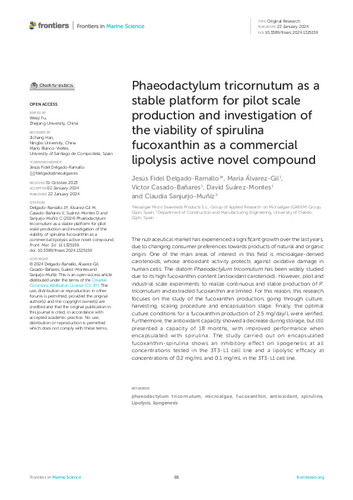Phaeodactylum tricornutum as a stable platform for pilot scale production and investigation of the viability of spirulina fucoxanthin as a commercial lipolysis active novel compound
Publication date:
Publisher version:
Citación:
Abstract:
The nutraceutical market has experienced a significant growth over the last years, due to changing consumer preferences towards products of natural and organic origin. One of the main areas of interest in this field is microalgae-derived carotenoids, whose antioxidant activity protects against oxidative damage in human cells. The diatom Phaeodactylum tricornutum has been widely studied due to its high fucoxanthin content (antioxidant carotenoid). However, pilot and industrial scale experiments to realize continuous and stable production of P. tricornutum and extracted fucoxanthin are limited. For this reason, this research focuses on the study of the fucoxanthin production, going through culture, harvesting, scaling procedure and encapsulation stage. Finally, the optimal culture conditions for a fucoxanthin production of 2.5 mg/day/L were verified. Furthermore, the antioxidant capacity showed a decrease during storage, but still presented a capacity of 18 months, with improved performance when encapsulated with spirulina. The study carried out on encapsulated fucoxanthin-spirulina shows an inhibitory effect on lipogenesis at all concentrations tested in the 3T3-L1 cell line and a lipolytic efficacy at concentrations of 0.2 mg/mL and 0.1 mg/mL in the 3T3-L1 cell line.
The nutraceutical market has experienced a significant growth over the last years, due to changing consumer preferences towards products of natural and organic origin. One of the main areas of interest in this field is microalgae-derived carotenoids, whose antioxidant activity protects against oxidative damage in human cells. The diatom Phaeodactylum tricornutum has been widely studied due to its high fucoxanthin content (antioxidant carotenoid). However, pilot and industrial scale experiments to realize continuous and stable production of P. tricornutum and extracted fucoxanthin are limited. For this reason, this research focuses on the study of the fucoxanthin production, going through culture, harvesting, scaling procedure and encapsulation stage. Finally, the optimal culture conditions for a fucoxanthin production of 2.5 mg/day/L were verified. Furthermore, the antioxidant capacity showed a decrease during storage, but still presented a capacity of 18 months, with improved performance when encapsulated with spirulina. The study carried out on encapsulated fucoxanthin-spirulina shows an inhibitory effect on lipogenesis at all concentrations tested in the 3T3-L1 cell line and a lipolytic efficacy at concentrations of 0.2 mg/mL and 0.1 mg/mL in the 3T3-L1 cell line.
ISSN:
Patrocinado por:
REA in the Horizon Europe Framework Program [101084437]
The author(s) declare financial support was received for the research, authorship, and/or publication of this article. This research was funded by REA in the Horizon Europe Framework Program within the funding scheme of Fair, healthy and environmentally-friendly food systems from primary pro-duction to consumption under the scope of the IMPRESS Project 101084437 (HORIZON-CL6-2022-FARM2FORK-02-two-stage).
The authors gratefully acknowledge the support of the Neoalgae Micro-Seaweed Products (Spain) Bioquochem S.L. (Spain) and Gaiker Technological Center (Spain) for this work.
Collections
- Artículos [37531]
- Construcción e Ingeniería de Fabricación [504]
Files in this item





